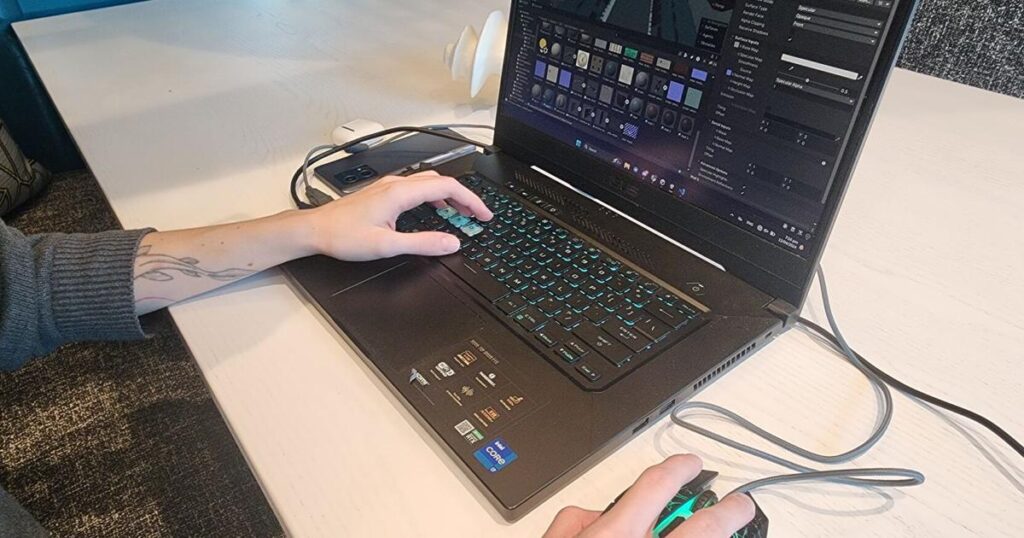
Lolita Kuznietzwa, a senior digital media major, spends Friday nights in her Modera apartment working on a prototype video game in the Unity engine.
One UCF student living on the downtown campus is finding a way to use video games to preserve and share his culture.
Lolita Kuznietsova, a senior digital media major in the game design track on UCF's downtown campus, showed off her prototype for a narrative-based game at Student Research Week in the Pegasus Ballroom last month.
Originally from Dnipro in central Ukraine, Kuznietsva moved to Orlando about four years ago to attend UCF. The last time she visited her hometown was in 2021, just before Russia's major invasion of Ukraine.
The war in Ukraine is now in its second year, and Kuzniecswa said there has been a divergence of focus in recent years.
“Apart from studying, I am always thinking of ways to get my family out of there,” Kuzniecswa said. “I’ll do the best I can to find my way.”
Although this project is not a direct response to the war, the first invasion was the moment a solo developer realized he needed to work on something. She wanted to create a project that would showcase her culture in a way that was easily accessible to all viewers.

Digital media giant Lolita Kuzniecswa's laptop is running a prototype version of a video game project in the Unity engine on a Friday night in her Modera apartment.
“The project itself, the video game, is set in Soviet Ukraine,” Kuznietsva said. “And it explores aspects of both history and mythology, which I believe together create a cultural understanding for the entire country.”
Kuznietsova described the project as a walking simulator in which the author introduces historical and mythological aspects of Ukrainian culture. This game features a unique mechanic in diegetic book writing.
“It's a unique way to play a game and write a book,” Kuznieczwa said.
Once the game is complete, it will be explained in three parts. In the first part he touches on 20th century Ukrainian history, in the second he adds elements of mythology and folklore, and the third continues to evolve as the project progresses.
Kuzniecswa had been toying with the idea of creating a project centered around her culture for a while, but she didn't initially intend to make a video game. She said that from the outside, Ukraine is usually seen as part of Russian culture, but in reality that is not the case.
“The main purpose of this project was to dispel misconceptions about how Ukrainian culture is perceived worldwide,” Kuznietsova said.
For the past two semesters, Kuzniecswa has been working on the prototype independently under the guidance of Dr. John T. Murray, assistant professor of games and interactive media. It was Murray who urged Kuznieczwa to present the project during his Student Research Week.
Student Research Week is an event held on the main campus that showcases the research projects of student organizations across all majors.
“All these different units come together to create a very large event,” said Jason Burrell, assistant director of the School of Visual Arts and Design. “With over 800 student participants, he shared over 500 projects over the course of a few days. This is a large undertaking, but one that represents us well.”
Mr. Burrell was involved in judging several projects in the competition section of Student Research Week. There he met Kunzietsova and interacted with her project.
Burrell was immediately impressed with the way Kuzniecła was using elements of gamification to express its unique culture.

Lolita Kuznietzwa, a senior digital media major, spends Friday nights in her Modera apartment working on applying textures to video games using the Unity engine.
“We will incorporate riddles and virtual environments to immerse people in the history and style of Ukrainian culture,” Burrell said. “It was an impressive project that cleverly utilized the key points of modern approaches.”
Although Kuznieczwa was nervous going into Student Research Week, she found the experience overwhelmingly positive.
“I didn't know the intended audience for the exhibition,” Kuznietsova said. “Obviously, young people were like, 'This is a video game, let's play it.'”
To Kuznietsova's surprise, people of all ages stopped and interacted with her project. Faculty from different departments, like Burrell, also came to her presentations and spoke with her.
Seeing the reaction to her project at Student Research Week gave Kuzniecswa new inspiration to complete it.
Currently, the full project schedule is still unknown, but Kuznietsova remains the sole developer and is expected to graduate at the end of the semester. The developer has stated that she hopes to complete and release the project by December 2025, but no firm date has been set at this time.
Kuznietsova believes that this project has the potential to not only change the way Ukrainian culture is received, but also how video games as a medium will be used in the future.
“I think it would be great if more people could become interested in Ukrainian culture,” Kuznietsova said. “More people will probably be able to see this project once it's finished and maybe learn something for themselves.” How can video games be used as a cultural preservation tool? ”
Friday night at Modera's Apartment, we interview Game Design Senior Lolita Kuznietsva about her narrative-based video game project, which aims to educate viewers about Ukrainian history and culture.


